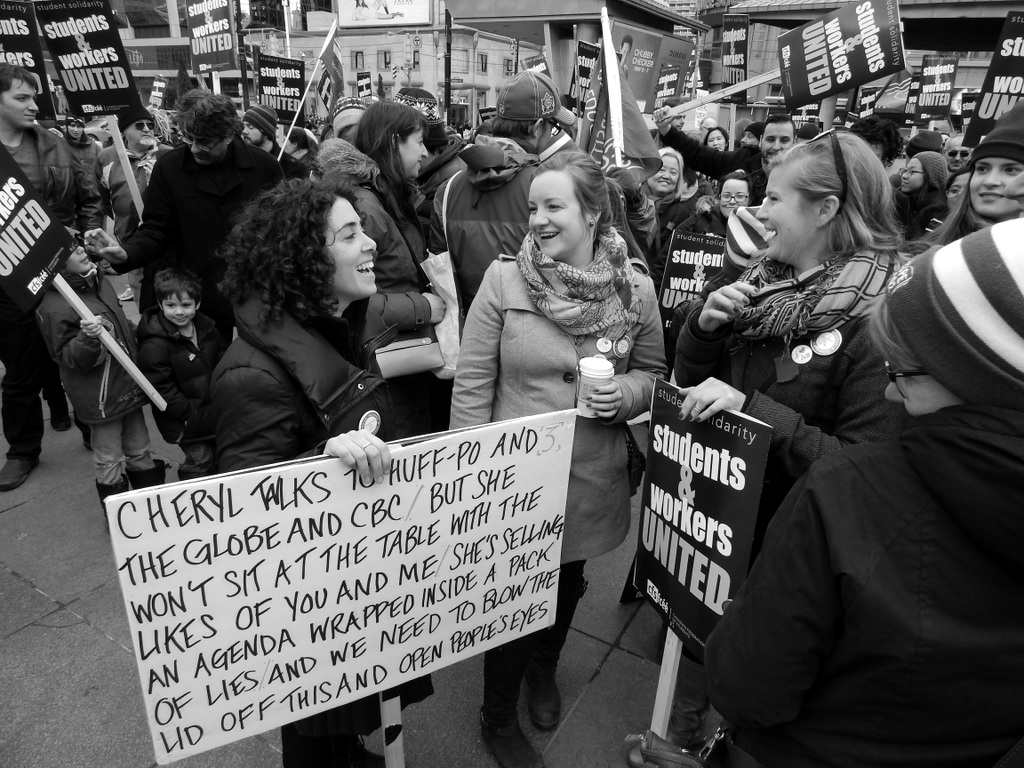“Ontario will be the best place to live, from childhood to retirement,” said Kathleen Wynne on the homepage of the Welcome to Ontario website.
Except, of course, if you’re a university student. Then it’s the worst place to live.
Ontario university students pay the highest tuition fees in Canada, averaging $7,539 per year, and the Liberal government spends the lowest amount per student than any other jurisdiction in Canada.
By the time they’ve completed their undergraduate degrees, students have racked up an average of $37,000 in debt.
Click here to see more photos from Saturday’s rally.
Striking education workers at York University and the University of Toronto held a joint rally on Saturday, renewing their call for Wynne’s government to support accessible, high-quality education in Ontario.
The rally was co-organized by the Canadian Union of Public Employees (CUPE) locals 3903 and 3902 that represent striking education workers at York University and the University of Toronto.
CUPE local 3903 has been on strike since March 3, CUPE local 3902 since February 27.
Nancy Ghuman, a York University graduate student who’s been on the picket lines every day, took part in Saturday’s rally at Yonge Dundas Square.
“It’s very tiring,” she said, referring to walking a picket line for four hours at a time. “It’s exhausting emotionally, physically and mentally.”
But at the same time, she’s excited because she feels like she’s getting firsthand experience of everything she learned during her undergraduate years. Things like the theory of institutions, power dynamics, community involvement and social movements.
“it’s been a great learning experience,” said Ghuman. “And it’s happening globally. Students are pushing back against the privatization of education.”
Around the world, university students are walking out of classes and occupying their campuses.
The first year Masters of Environmental Studies (M.E.S.) student receives a funding package of $9,000 per year from which she pays $6,000 in tuition fees, leaving her with $3,000 per year for living expenses.
“Which is a very small amount to live off,” said Ghuman.
As a graduate assistant, she “officially” puts in five hours of research per week. But not before putting in 40 hours of preliminary research first.
“So you’re probably putting in about 45 hours. I personally put in 54 hours per week, year round, from Monday to Saturday either in the library or in class. And then I like to give myself Sundays off but I feel guilty so I’m still doing something.”
She was living on her own but finances forced her to move back in with her parents. She now has $20,000 of debt that accumulated since her days as an undergraduate student, even though she worked three jobs at the time.
Even so, the CUPE local 3903 member hopes to pursue a PhD in renewable energy policies.
So Ghuman won’t ratify any new contract that doesn’t include tuition indexation for all domestic and international students. Last year, York raised annual tuition fees for international graduate students by $7,000.
Her biggest concern is a societal shift towards privatization where one day only the financially elite will have access to higher education.
In spite of it all, York University professor of Political Science David McNally is encouraged by the growing opposition by youth, students and precarious workers to escalating post secondary education costs while they’re getting stuck in precarious, underpaid jobs.
“And I think we’re going to see this kind of thing snowballing,” said McNally.
“It’s in the same spirit as the Montreal and Quebec student strike of 2012, of the Chilean student movement for free tuition. A sign that young people, whose economic and social futures are deteriorating, are starting to rebel, protest and mobilize.”
The York University Faculty Association (YUFA) member doesn’t believe that student protests are going away in the near future.
“I’m proud also that many faculty members at York are organizing and acting in solidarity with our graduate students,” he said.
McNally said the real costs (accounting for inflation) of post-secondary education have quintupled since he was a graduate student in a city where rent, food and transportation costs have also skyrocketed.
“And it’s not like there’s a plum job waiting for them when they get their M.A. or their PhD. They’re likely to be (only) finding part-time and contract work.”
If a negotiated settlement isn’t reached soon and the province rushes things and decides to legislate striking education workers back to work, McNally and his colleagues are prepared to lobby on their behalf.
“We will try to make the case as strongly as we can that, as the Supreme Court of Canada has already confirmed, the right to belong to a union is a fundamental right in this county and the right to strike is also a fundamental freedom,” he said.
“We’ll try to make that case that they (the universities) are violating basic principles of union rights and civil rights. But even if they do go that road, all they’re doing is pushing the struggle somewhere else. This issue will not disappear, even if they use law to end the strike.”



